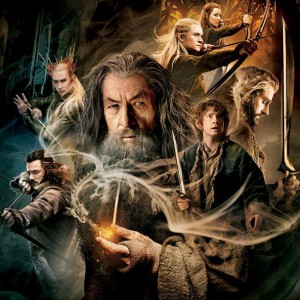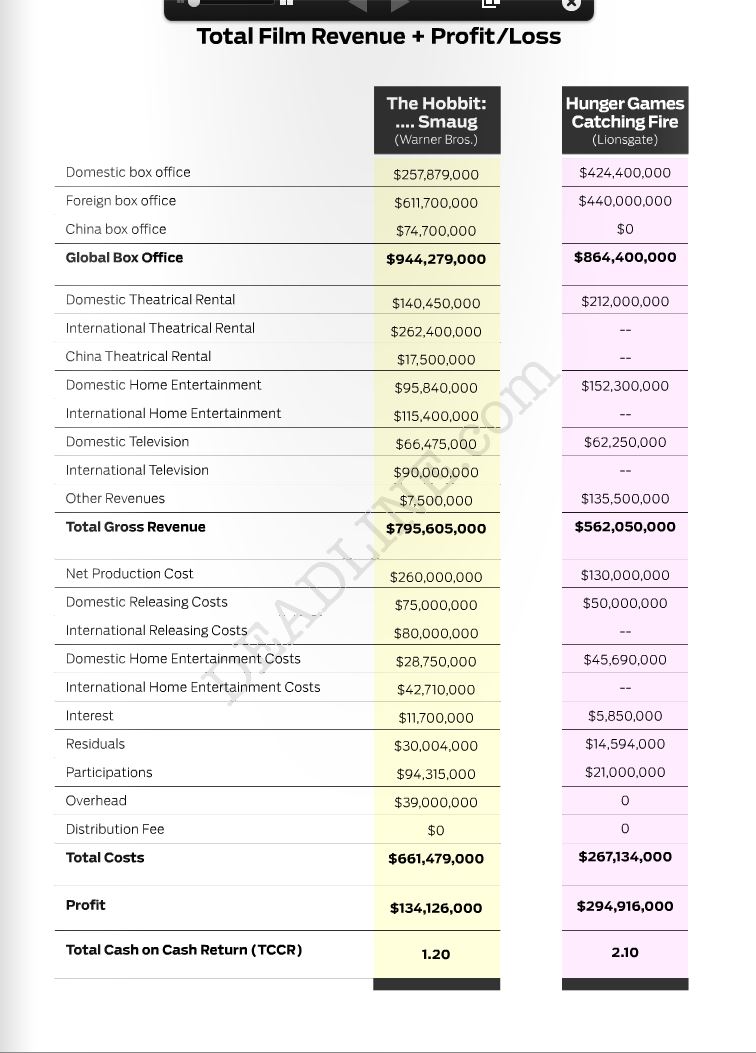 Box office reporting focuses heavily on ticket sales and revenue numbers. So it’s no secret that (according to latest Box Office Mojo numbers) The Hobbit: The Desolation of Smaug has pulled in just over $944 million in ticket sales.
Box office reporting focuses heavily on ticket sales and revenue numbers. So it’s no secret that (according to latest Box Office Mojo numbers) The Hobbit: The Desolation of Smaug has pulled in just over $944 million in ticket sales.
Profit figures, on the other hand, tend to be more opaque and mysterious.
However, movie website Deadline | Hollywood has crunched some numbers with a number of “experts” as part of its effort to unearth the most valuable blockbuster of 2013. By its calculation, the second film in Peter Jackson’s Hobbit sequence has (thus far) made a profit of $134.1 million.
Just how did they do it?

The Hobbit: Desolation of Smaug profit breakdown. Source: Deadline | Hollywood.
Explaining the earnings
Disregard the calculations for The Hunger Games: Catching Fire in the second column — it’s part of the head-to-head thing that Deadline is conducting.
The first thing to realise (and it took me a little bit of research to work it out) is that that enormous $944 million global box office is split a number of different ways. Nominally at least (Hollywood accounting practises are notoriously dubious), distributors and theatres are taking a goodly chunk of that gross.
How big?
Well, according to Deadline’s figures, USA domestic distributors and theatres are taking just under half the domestic box office, while Warner Bros. sees a mere 42.9% of the foreign take and as little as 23.4% of the Chinese gross. The remainder — named Theatrical Rental — is Warner Bros. income. Thus, of that $944.2 million, only $420.3 will make its way to Warner Bros. coffers.
That’s why, according to Deadline, even with other revenues (telly and etc.) factored in, Warner Bros.’ gross revenue from The Desolation of Smaug will hit only (only!) $795.6 million.
Accounting for the expenses
Deadline puts Desolation of Smaug’s production cost at $260 million. I’m not entirely certain how they arrived at that, I’ve seen figures as low as $225 million, and others as high as $295 million (the latter admittedly including printing and advertising costs).
Yet Deadline lists printing and advertising (domestic and international) costs as an additional $155 million.
It’s a puzzle, but this article on io9 gives some insights.
According to Contrino, the Print & Advertising (P&A) costs of a movie can be incredibly high — for a small $20 million film, the promotional budget can be higher than the production budget. That’s because those films are often romantic comedies or kids’ movies, which are cheap to make but still need a lot of promotion. For a film which cost between $35 and $75 million to make, the P&A budget will most likely be at least half the production budget. And the numbers only go up with bigger films. “If the studio spends a lot on the budget, they’re going to want to protect that investment by advertising it heavily,” says Contrino.
If Deadline is correct, the amount invested on marketing The Desolation of Smaug’s around the world clocked in at more than half its estimated production budget.
Rights payments presumably include royalties to the late Saul Zaentz’s Middle-earth Enterprises as well as to Tolkien Estate, while Participations refers to payments to actors, writers and directors as a percentage of either gross or net profit. And overheads seems to be calculated at a straight 15% of the production budget.
According to Deadline, all these factors mean that the total cost of making, marketing and putting The Desolation of Smaug on screen add up to a sizeable $661.4 million.
Return on investment
Which brings us to the bottom line — a profit of $134.1 million. As Deadline calculates, that’s a cash return on cash invested of 20% (134m/661m x 100). It’s a return on investment that as best I can tell compares favourably against other forms of investment — the 10-year (to December 31, 2013) performance of the the S&P 500 is an average annual total return of 7.40%. US bonds, as gauged by the Barclays Aggregate U.S. Bond Index, average 4.55% annually over the same period.
The numbers for The Hunger Games: Catching Fire (an ROI of an unbelievable 200%) illustrate even more starkly (in big, fat $$$ signs) the reason studios relentlessly chase blockbuster success.
Of course, the flipside is the greater risk involved. Stocks and bonds, generally, offer a safer investment. For every profitable film, there’s a long list of grand commercial failures that see studios losing tens of millions of dollars. And that’s the hard calculus under all that creative accounting.
Note: This is mostly an attempt to puzzle out the numbers. I am not an expert (in this area at least). If there’s anything I’ve missed, or seems out of whack, leave a note in the comments or drop me a note at demosthenes at the onering dot net.



 The Hobbit: The Desolation of Smaug delivered Warner Bros. its largest-ever three-day box office takings in China as the film finally debuted there over the weekend.
The Hobbit: The Desolation of Smaug delivered Warner Bros. its largest-ever three-day box office takings in China as the film finally debuted there over the weekend.
